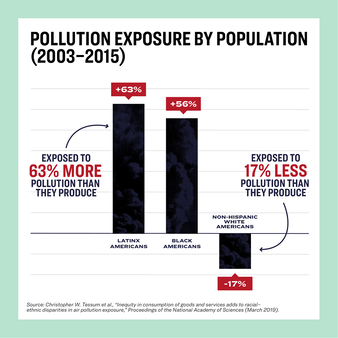
Yesterday, Elizabeth Warren posted a chart to her Facebook page that outlines pollution exposure by race/culture. She captioned her post, "Black and Latinx families are more likely to live in neighborhoods with higher concentrations of air pollution than white families. Environmental justice must be at the center of our response to climate change." This chart links consumption and exposure: it shows Latinx Americans are 63% more exposed to pollution in relation to pollution they produce; Black Americans are 56%; and Non-Hispanic White Americans 17% less. I suspect this chart would be even worse if we considered the pollution experienced by people living in the Global South, vs. that produced in the Global North.
I particularly like Warren's use of the phrase "environmental justice," to point toward the bigger challenges facing us. As I discuss in my book, many of the solutions to climate change will exacerbate other ecological crises we face. In particular, many recommended solutions will worsen the e-waste and plastic waste crises. But plastics actually contribute to climate change (so making more plastic devices to technologize our way out of climate change probably won't work well).
Race intersects with the ecological crises in many important ways, especially as one part of economic injustice. As the NRDC states: "Communities of color, which are often poor, are routinely targeted to host facilities that have negative environmental impacts — say, a landfill, dirty industrial plant, or truck depot. The statistics provide clear evidence of what the movement rightly calls 'environmental racism.' Communities of color have been battling this injustice for decades."
But it's not only pollution. Communities of color have the greatest number of deaths during climate-caused heatwaves, suffer more due to increased hurricanes, droughts, and floods.
As teachers, we must look at the ecological crises as plural and intersectional. As I wrote in my book, "It seems essential that teachers are aware of the intersectional challenges arising among ecology and economics." And later, "Intersectionality proposes gender, racial, economic, and ecological issues can be analyzed as related--that is, intersecting. If intersectionality is accurate, it is impossible to improve social concerns without addressing the ecological crises. Intersectionality exists because there is an underlying reality, that of unjust domination."
Four phrases, then, that teachers should know and speak, which are broader than "climate change," are: 1. ecological crises, 2. environmental justice, 3. economic justice, and 4. environmental racism.
DJS
 RSS Feed
RSS Feed
